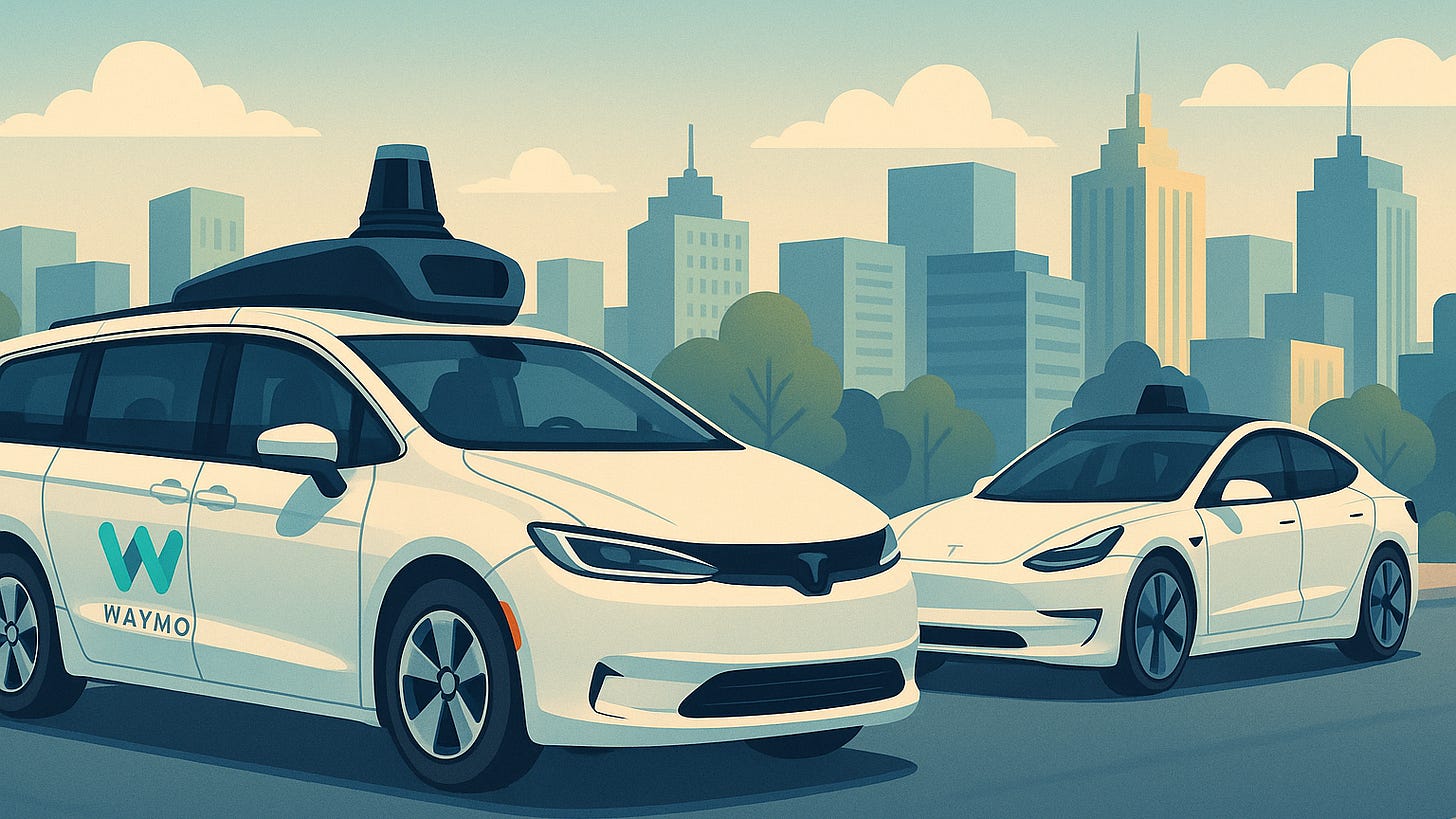📰 Own a Robotaxi? Sooner Than You Think
Alphabet’s Waymo hints at personal ownership of self-driving cars. Tesla’s already on the move. Could your next car earn money while driving itself?
In a surprising shift, Alphabet GOOGL 0.00%↑ CEO Sundar Pichai has opened the door to a new future for Waymo, the company’s autonomous vehicle division: personal robotaxi ownership. Speaking during Alphabet’s Q1 earnings call, Pichai said there is “future optionality for personal ownership” of Waymo’s self-driving vehicles. That’s the first time Alphabet has suggested it might one day let individuals buy their own Waymo-powered robotaxi.
Currently, Waymo operates a fleet of over 700 self-driving cars across cities like San Francisco, Phoenix, Los Angeles, and Austin. The company runs fully driverless rides, with no human behind the wheel, and it’s the only U.S. company doing this at scale, while charging real fares.
Pichai’s comment may have been brief, but its impact is big. It signals a possible future where you don’t just ride in a robotaxi, you own one.
From service to ownership
Until now, Waymo has operated under a fleet-based model: Alphabet owns the cars, and users book rides through the Waymo One app.
But a shift to personal ownership would change everything. It could mean consumers could buy their own Waymo-equipped vehicle, keep it at home, and choose how it's used, either for private travel, or as part of a ride-hailing network generating income on the side.
David Heger, an analyst at Edward Jones, called it “a natural next step” if Waymo wants to scale. Since Alphabet doesn’t manufacture cars itself, such a move would likely involve deeper partnerships with automakers like Hyundai, Zeekr, or Jaguar, companies already building vehicles with Waymo tech onboard.
The Tesla model: own the car, earn with the car
While Alphabet tests the waters, Tesla is already diving in. Elon Musk has long envisioned a world where Tesla owners can list their self-driving vehicles on a shared robotaxi network. You buy the car, and when you're not using it, it earns money by giving rides to others. fully autonomous, fully electric.
Musk claims Tesla’s cars will cost far less than Waymo’s, since they rely only on cameras and AI (no lidar or radar). According to him, a Tesla robotaxi costs about a quarter of what a Waymo does, making it easier to scale.
Tesla is still aiming to launch its robotaxi service in mid-2025, starting in Austin, Texas. And unlike Waymo, Tesla wants to make robotaxi ownership the norm, not the exception.
Why personal ownership of robotaxis matters
This isn’t just about buying a fancy new car. It’s about changing what ownership means.
If you can own a robotaxi, you can:
Turn your car into a source of income
Avoid the usual downtime (most cars sit parked 90% of the time)
Join a new kind of mobility economy where cars are more like mini-businesses
And it’s not just Tesla and Waymo watching this space. With Cruise shut down and Apple pulling back from its car project, Chinese brands like Baidu and Zeekr are now leading the push to explore what happens when self-driving technology goes mainstream, and personal.
The road ahead
Alphabet’s statement may have been short, but the message is powerful: the future of robotaxis might not just be fleets owned by tech giants, it could be your car, your decision, and your profit. Tesla is already preparing for it. Waymo is now considering it.
So the question isn’t just who builds the best self-driving car. It’s: who gives you the keys?
Source: Reuters, Tech Funding News
Thank you for reading! 🙏
We put a lot of love into creating this post for you. If you enjoyed it, feel free to click the ❤️ button so more people can discover it on Substack.
Don’t hesitate to share your thoughts in the comments — we’d love to hear from you 💬
Disclaimer:
The information and opinions provided in this article are for informational and educational purposes only and should not be considered as investment advice or a recommendation to buy, sell, or hold any financial product, security, or asset. The Future Investors does not provide personalized investment advice and is not a licensed financial advisor. Always do your own research before making any investment decisions and consult with a qualified financial professional before making any investment decisions. Please consult the general disclaimer for more details.



